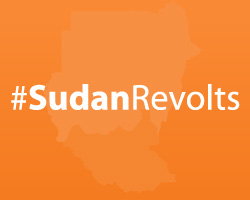
As anti-regime protests in Sudan enter their second week, the government is cracking down on activists and journalists. Security forces have used tear gas and rubber bullets to disperse crowds and have detained hundreds of protesters since demonstrations began at the University of Khartoum on June 16. The most recent display of government force has been its systematic suppression of the media and recent reports of a shutdown of internet and cellphone access in Khartoum.
According to a Sudanese policy analyst, since June 25, websites of the online newspaper Hurriyat, as well as the online forums Al-Rakoba and Sudanese Online were blocked in Sudan. Moreover, in anticipation of protests today following Friday prayer, activists on the ground confirmed that internet and cellular phone services have been shut down in Khartoum since midnight.
Security forces have arrested, detained and deported several journalists who were trying to cover protests. On June 26, Sudanese authorities ordered the Egyptian journalist Salma el-Wardany to leave Sudan. El-Wardany, who was covering the protests for Bloomberg News, was trying to renew her press accreditation, when authorities informed her that she was being deported. Her sister Lina wrote on Twitter (@linawardani) that security agents treated the journalist “like a criminal or fugitive,” at first prohibiting her from packing her bags, and then allowing her to collect a few of her things and head to the airport, but with the escort of security guards.
Other international journalists have also been harassed by security forces. On June 19, the National Intelligence and Security Services, or the NISS, arrested Agence France-Press correspondent Simon Martelli. He was detained for 14 hours in northern Khartoum.
The recent crackdown is not just on the activities of international journalists, but Sudanese authorities have also made a concentrated effort to muffle the voices of local reporters and social media activists. On June 27, twelve NISS agents raided the home of Maha El-Senoussi, a prominent blogger. The agents—two of whom were armed—confiscated her laptop and her phone. The NISS agents instructed El-Senoussi to accompany them and detained her for three hours. Another well-known blogger, Usama Mohamed, has been in NISS custody since June 22. His family has not heard of his whereabouts since that day. A Twitter campaign was launched to bring attention to the blogger’s detainment, using the hashtag #FreeUsama.
Despite President Omar al-Bashir’s claim that these protesters are insignificant “bubbles,” the widespread crackdown on journalists and activists is indicative of the Sudanese government’s increasing nervousness about the recent slew of anti-regime protests.
The Sudanese activist group Girifna reported that this series of demonstrations “feels different” than previous anti-regime protests. Analysts claim that the Sudanese are not only fed up with the brutality of al-Bashir’s 23-year-long-regime, but are also responding to Sudan’s failing economy. With inflation up to 30 percent and recent austerity measures, a broader section of the Sudanese population is discontent with the regime and demanding change.

